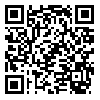BibTeX | RIS | EndNote | Medlars | ProCite | Reference Manager | RefWorks
Send citation to:
URL: http://ijpcp.iums.ac.ir/article-1-571-en.html
Objectives: This study was carried out to compare the personality traits, personality disorders, and problem-solving strategies in self-introduced addicts and the normal population. Method: 50 self-introduced addicts, who had presented for the first time to the addicts’ health center in the city of Rasht, Iran, were compared to 50 normal subjects who were matched on some demographic charac- teristics in a descriptive cross-sectional study. Data were gathered using the NEO Five-Factor Inventory- Revised (NEO-FFI-R), the Millon Clinical Multiaxial Inventory-II (MCMI-II), and Problem-Solving Strategies Questionnaire. Data were analyzed using correlation coefficient and multi-factor analysis of variance. Results: Addicts scored higher than normal people on the measure of neuroticism (N), and lower on measures of agreeableness (A), openness (O), and conscientiousness (C) (p<0.05). No significant difference was showed on the measure of extraversion
(E) between the two groups. There was a significant difference in most measures of personality disorder between the self-introduced addict group and the normal group with the addict group scoring higher in these measures (p<0.05). Moreover, addicts, in comparison with normal individuals used non-constructive problem-solving strategies such as avoidance and helplessness (p<0.05). Conclusion: An assessment of the three over-lapping areas of personality traits, problems, and disorders in addicts contributes important information for a better differentiation and definition of addicts and has implications for their treatment.
Received: 2009/01/24 | Published: 2008/11/15
| Rights and permissions | |
 |
This work is licensed under a Creative Commons Attribution-NonCommercial 4.0 International License. |



